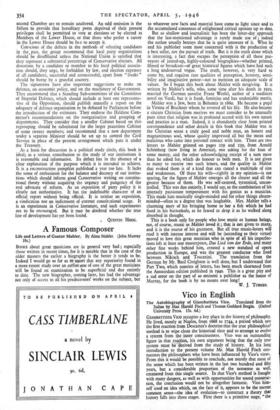A Famous Composer
BOOKS about great musicians are in general very bad ; especially those written in recent times, for it is notable that in the case of the older masters the earlier a biography is the better it tends to be. Indeed I would go so far as to assert that any superiority found in a more recent study over an earlier- one of one of the great musicians will be found on examination to be superficial and due entirely to date. The new biographer, coming later, has had the advantage not only of access to all his predecessors' works on the subject, bu
to whatever new facts and material have come to light since and to the accumulated consensus of enlightened critical opinion up to date.
But so shallow and journalistic has been the latter-day approach that the last-mentioned advantage is rarely made use of • indeed the author usually betrays that he is quite unaware of it. What he and his publisher seem most concerned with is the production of a best seller, not the pursuit of truth. But it is the truth alone which
is interesting, a fact that escapes the perception of all those pur- veyors of jazzed-up, highly-coloured biographies—whether printed, filmed or broadcast—of great historical figures which have had such a long undeserved vogue. The truth, however, is very hard to come by, and requires rare qualities of perception, honesty, sensi- bility and imaginative power—not to mention an adequate scale of values. So I began this book about Mahler with misgiving. It is written by Mahler's wife, who, some time after his death in 1910, married the German novelist Franz Werfel, author of a mediocre novel on Verdi, but it is frank, feminine and has undeniable merits.
Mahler was a Jew, born in Bohemia in 1860. He became a pupil
in Vienna of Bruckner whom he revered all his life. He also became a sincere Christian from motives we must consider to be unusually pure since that religion was in profound accord with his own nature and practice as a man. Indeed, it is abundantly clear from printed correspondence and other details in this book that Mahler was in the Christian sense a truly good and noble man, an honest and magnanimous soul, whose quality impressed all but the mean and malicious who came into personal contact with him. There are two letters to Mahler printed on pages 229 and 23o, from Arnold Schonberg (now living in America), one asking for the loan of some money, and the other acknowledging receipt of a sum more than he asked for, which do honour to both men. It is not given to many to receive two such letters, and the quality in Mahler that evoked them is of a kind that can cancel a multitude of sins and weaknesses. Of these his wife—rightly in my opinion—is not sparing, for the figure of Mahler emerges all the clearer and all the greater because of them. He was self-centred, tyrannical, uncon- trolled. This was due entirely, I would say, to the combination of his intensely passionate temperament with his genius as a musician. This made him musically single-minded and for other things absent- minded—often to a degree that was laughable. Mrs. Mahler tells a charming story of his bringing home to her a fish which he had fixed in his buttonhole, as he feared to drop it as he walked along absorbed in thought.
This is a book only for people who love music or human beings,
not, of course, music as Mahler loved it ; that is not given to many, and it is the source of his greatness. But all true music-lovers will read it with intense interest and will be (according to their virtue) moved to love this great musician who in spite of all his imperfec- tions left at least one masterpiece, Des Lied von der Erde, and many other fine works behind him, created a new standard of opera production in Europe, and was the greatest conductor who lived between Nikisch and Toscanini. The translation from the German by Mr. Basil Creighton is well done, but I understand that Part Two, which consists of letters, has been much shortened from the Amsterdam edition published in 1940. This is a great pity and a sad error on the part of so eminent a publisher as the house of Murray, for the book is by no means over long! W. J. TURNER.






























 Previous page
Previous page